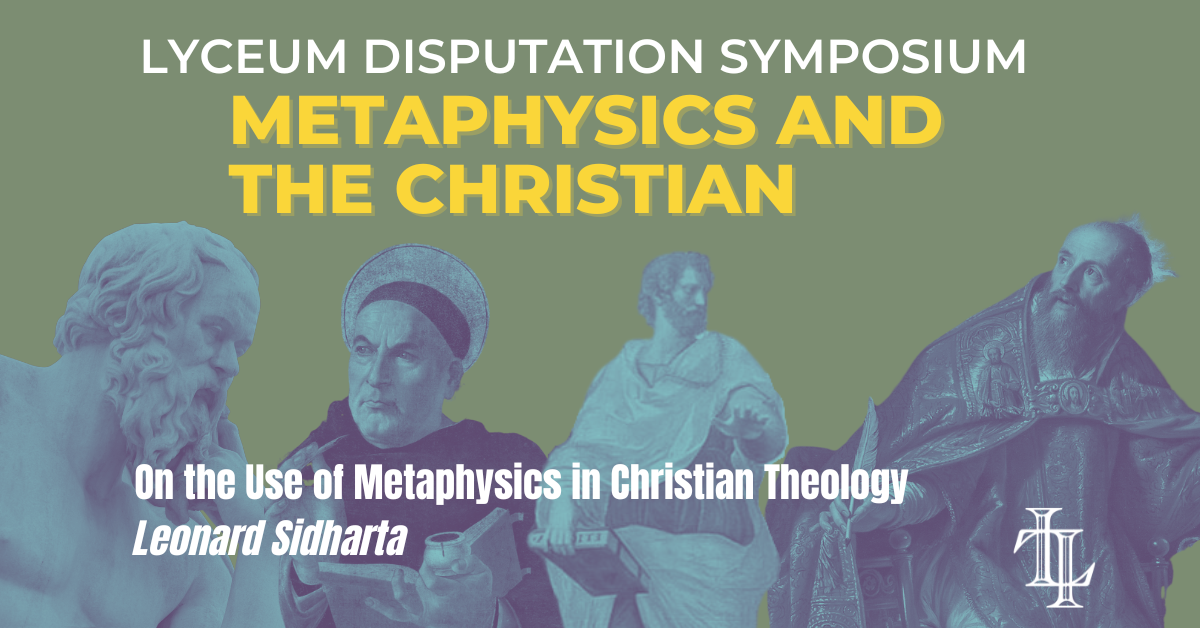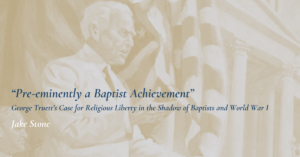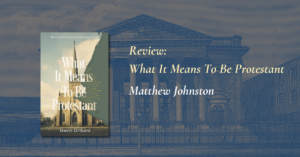Editor’s Note: This is part 5 in our Lyceum Disputation series on metaphysics and the Christian. Stay tuned for further installments which can be found here when available. As with all our work, the London Lyceum publishes a range of viewpoints to encourage thinking.
I.
“What has Athens to do with Jerusalem?” asked Tertullian. This question, coupled with Pascal’s enigmatic statement: “God of Abraham, God of Isaac, God of Jacob, not of the philosophers…” are often quoted, arguably beyond both thinkers’ original intents, to discourage the use of philosophy and metaphysics in theology. Misgivings about the incorporation of metaphysics in theology often come from the fact that the most formidable objections to Christianity are frequently philosophical or metaphysical in character. Another cause, which is more pertinent to the present essay, is the worry that by using metaphysics, Christians illicitly draw from a different cognitive well and thus dilute theology. Many theologians, for example, think that the Church fathers’ and medieval theologians’ reliance on metaphysics in their doctrinal systems is tantamount to the Hellenization of the originally more Hebraic biblical faith. More recently, some theologians also claim that scientific discoveries have largely invalidated metaphysics. In short, the use of metaphysics in theology is at best irrelevant or at worst corruptive.
On the contrary, I will not only argue for the positive role of metaphysics in theology but propose a stronger claim: for theologians, metaphysical thinking is ineliminable and indispensable. My argument addresses Christians, especially the Protestants, who reject metaphysics on the basis of a strong view of scriptural authority. Yet my defense of metaphysics is an opinionated one, as I rely on a version of traditional or broadly Aristotelian metaphysics. And assuming the truth of such traditional metaphysics, I will modestly show that it is reasonable to claim that metaphysics is ineliminable and indispensable in theology.
In this brief essay, I will first clarify the definitions of metaphysics and theology, and then argue that given the Protestant doctrine of general revelation, every discipline, including metaphysics, is rooted in revelation and thus in principle cannot challenge scripture, unless that discipline is false or obsolete. But proving that metaphysics is false or obsolete is extremely difficult and controversial. Saying that scripture (or theology, as the science of scripture) is compatible with other disciplines, however, is necessary but insufficient. Even if metaphysics does not contradict theology, the use of the former in the latter requires further justifications, otherwise the independence of theology would be compromised. My responses are twofold: first, our misgiving about the use of other disciplines in theology comes from a too rigid demarcation between special and general revelations. The specialness and authority of scripture does not imply that it cannot be populated by the denizens of general revelation. Second, I briefly present an Augustinian theory of the divine ideas, which buttresses the claim that metaphysical concepts suffuse all intelligible discourses about reality, and metaphysics therefore has interdisciplinary significance.
II.
To argue for the positive role of metaphysics in theology, one should clarify first the definitions of both disciplines. I believe that misgivings on this issue can be straightened out, only if we can define both in a way that makes their positive relationship possible.
What is metaphysics? I prefer a traditional definition of metaphysics as the study of the most fundamental aspects of reality that transcend interdisciplinary boundaries. This definition is rooted in the Aristotelian understanding of metaphysics as the science of being qua being. Different disciplines investigate different things under specific aspects, while metaphysics aims at knowing the general nature and aspects of all things insofar as they are beings. Therefore, ontology, as “the study of what categories of entities there are and how they are related to one another”, is placed “at the heart of metaphysics.”[1] In light of this, metaphysics investigates ontological categories (substance, property, universals, particulars, etc.), aspects (modality, spatio-temporality, etc.), and relations (causation, mereology, etc.), all of which constitute the fundamental structures of reality.
How about theology? For Christians who hold a strong view of scripture, it is quite uncontroversial to say that theology is demarcated from other disciplines by scriptural truths as its main investigative object. We can infer from this that every discipline is demarcated from other disciplines by its own class of truths or objects of inquiry. Protestant theologians traditionally affirm that the totality of truths that all disciplines aim come from God, but scriptural truths are the only class of truths that contains the saving self-communication of God. Thus, to underline the unity of all truths (in their divine source), theologians see all truths, regardless of their corresponding disciplines, as revelations, but to underline the uniqueness of scripture, they call scriptural truths special revelation, and all other truths general revelation. Hence, all disciplines are not only demarcated by their own objects but also by the kinds of revelation that underlie them. It is clear then that all disciplines belong to either general or special revelation, while theology is the only discipline that belongs to the latter.
Now, if all branches of learning come from divine revelation, then in principle there can be no conflict between theology and other disciplines. Likewise, provided that metaphysics is a legitimate discipline, then there should be no conflict between metaphysics and theology. Two disciplines are in conflict, only if they deliver contradictory results of inquiries on the same issue, so presumably, theologians are wary of metaphysics, only if the results of metaphysical inquiries often contradict theological statements. But this is far from certain. For two millennia, theologians have relied on metaphysics to clarify and defend the contents of scripture. If metaphysics appears to contradict theology, then the problem lies more with a deeper preconception against Christianity. Here we need to differentiate special metaphysical views or doctrines, some of which are antithetical to the faith, from metaphysics as a discipline and a set of conceptual tools, which by themselves are more neutral. Another possibility is that metaphysics is obsolete and so its use is unwarranted. Yet, this is a contested narrative. The alleged demise of metaphysics often presumes a metaphysical view that does not win universal allegiance. Thus, if metaphysics is legitimate and Christians can still practice it without either abandoning their faith or becoming heretics, then there might be no decisive objections to the compatibility between theology and metaphysics.
III.
Nevertheless, the fact that metaphysical inquiries in general do not contradict theological truths does not imply that theology should adopt metaphysics. Algebra or chemical engineering does not contradict scripture, but it is not directly relevant to the explanation of scriptural doctrines. On the other hand, disciplines like archeology, linguistics, sociology, and history may help theologians dig the riches of scripture, and some concepts from these disciplines can even intersperse with scriptural language. This demonstrates that human life in its linguistic, historical, sociological, or cultural dimensions, which constitutes a big chunk of general revelation, is the conduit of special revelation. Every discipline is a systematic effort to understand a segment of the divine revelations, and although disciplines like theology and history investigate different kinds of revelations, they intersect in one area of general revelation that we may call human life.
In short, in those aspects of reality that pertain to human life, general and special revelations somehow overlap. Disregarding their interconnection belittles the role of general revelation and causes biblicism or anti-intellectualism, while ignoring their distinction diminishes the significance of scripture and invites relativism. Herman Bavinck, borrowing from German idealists, introduced the word “organic” to explain the interrelationship between two revelations. For Bavinck, while scripture provides the information that unites all kinds of disciplines and revelations, it cannot stand alone without general revelation. Bavinck here invites us to affirm both the superiority of special revelation and the interdependence between special and general revelations. Without the means of language, history, and culture, which instantiates general revelation, scripture would be unintelligible. Hence, it is not only true that the nature of general revelation cannot be fully grasped without special revelation, but the contents of special revelation cannot also be understood without general revelation. To conclude, to employ non-theological disciplines in theology is to investigate the elements of scriptural content qua their function as the medium of special revelation, so as to clarify, and not adulterate, the scriptural message.
It is on the basis of the aforesaid argument that we can figure out and justify the use of metaphysics in theology. But in what sense can we say that metaphysical objects, which belong to general revelation, are also the conduit of special revelation? Metaphysics investigates categories, properties, relations, etc. that constitute the fundamental structure of reality. The fundamentality of metaphysical objects entails their generality, which explains their interdisciplinary applicability.[2] In this respect, metaphysics is like logic and mathematics. Although the subject matters of different disciplines often seem mutually incommunicable, all of them are subject to logical patterns, mathematical analysis, and metaphysical inquiry.
Although logic, mathematics, and metaphysics seem esoteric, they are rooted in the mundane observation of the sameness and difference of things. A mundane differentiation of things (“Fred the boy is not Fido the dog”) can lead to the discovery of the logical principle of non-contradiction (one cannot say that both “Fido is a dog” and “Fido is not a dog” are true), an arithmetic proposition (one boy Fred with one dog Fido), and metaphysical queries. We think metaphysically when we ask: Fred and Fido are two things, but how can we account for the most fundamental factors that contribute to their differences? Metaphysically, saying that Fred is different from Fido here implies that they have different essences (i.e., humanity and doghood). From the concept of essence, one can derive other concepts like necessity, properties, and so forth, along with further conceptual derivations like natural and metaphysical necessities, essential and accidental properties, and so on. These derivations are occasioned by further metaphysical questions that surpass the available data, for example: “In other possible worlds like us, would a baby who shares Fred’s essence necessarily grow to be a boy?” (answering this question affirmatively implies that things with essences like Fred are not just conglomerations of atoms) or “the fact that Fred’s skin is tanned is attributable to Fred, but is it something that makes Fred truly different from Fido?” (answering this negatively is asserting that “being tanned” is Fred’s accidental property). There are other queries as well, for instance: Since all Fido’s molecules undergo constant change, how can we say that last year’s Fido and today’s Fido are identical?
If metaphysics grows from the mundane intellectual observation of the sameness and difference of things, then it is reasonable to say that human intellect is predisposed to metaphysical thinking. Hence, serious examinations of the sameness and difference of things in all disciplines, including theology, would actuate one’s metaphysical predisposition. The biblical doctrine of the absolute Creator-creature distinction, for instance, metaphysically entails that the essence of the Creator is distinct from the essence of human beings. Another example comes from the area of biblical anthropology. The assertion that presently, all human beings are sinful does not entail that humanity is defined by sinfulness, that is, being sinful is not an essential property of humanity. This metaphysical statement is also a reasoned defense of the historicity or contingency of the fall, the denial of which would render God responsible for moral evil and compromise the coherence of the divine nature. Besides, metaphysics can provide conceptual imaginaries that make our intellect see things more clearly. To say that the creation of humanity is contingent on God’s will, for example, is to claim that there is at least one possible world that does not contain any hominids, while in explaining a modest version of divine immutability, one can say that God’s essence or character remains the same in all possible worlds.
IV.
Far from Hellenizing the faith, doing metaphysics in theology naturally grows from a disciplined effort to understand and clarify what one believes. Metaphysical thinking can be triggered by Sunday school students’ questions, one’s own bewilderment about certain doctrines, and objections from non-believers. Since faith seeks understanding, metaphysical reflection is inevitable during one’s faithful study of scripture, and so metaphysical queries and answers cannot be simply dismissed as impious curiosity and philosophical sophistry. Reason, even in its employment in faith, always strives to dig deeper. This tendency moves reason towards its final goal, which is the full knowledge of reality. To journey to its goal, reason needs to probe into the most fundamental aspects of reality, some of which are discoverable via metaphysics. Thus, metaphysical thinking represents reason’s native tendency, and in using reason, faith activates and uses that tendency to approach faith’s own final goal, which is the perfect knowledge of God. Hence, the Augustinian dictum that faith seeks understanding corresponds to the Thomist maxim that grace perfects nature. Further, metaphysical thinking is quite apt for faith-motored theologizing, for faith’s journey to its goal concerns the full picture of reality as the arena of God’s creation and redemption. Both theology and metaphysics attempt to see things from the widest possible viewpoint, which imbues their inquiries with interdisciplinary significance.
Metaphysical objects are not as concrete as the objects of other disciplines, but precisely because of this, metaphysics can be “a universal science…[that] examines the items that constitute the subject matter for the other sciences.”[3] The interdisciplinary relevance of logic, mathematics, and metaphysics is due to their function as the explanatory framework of all things, which implies that these disciplines deal with the frames or structures of reality. These structures are inseparable from or embedded in things; if nature is like a house, then they are like beams or framings that structure the whole edifice. We can say in an oversimplified manner that whereas logic and mathematics study the structural rules of things, metaphysics explores the structural categories or aspects of things. If logical and mathematical rules are the most general rules that regulate all other rules or laws, metaphysical categories are the most general categories that underlie all other kinds of classifications. Therefore, metaphysics is “ineliminable and conceptually necessary as the intellectual backdrop for every other discipline.”[4] Here, metaphysics can play the role of interdisciplinary lingua franca that shows the interrelatedness of all disciplines (since it deals with the most fundamental aspects of all beings) without obliterating their differences (since it does not concern with the more concrete aspects of beings).
The generality of mathematics, logic, and metaphysics entails their normative fundamentality, which means that they constitute the intelligibility conditions for all knowledge. To make things or beliefs increasingly intelligible is to probe into their most fundamental implications, categories, or relations with other equally fundamental concepts, and this is what metaphysicians and philosophers do. Consequently, discouraging metaphysical thinking in theology is in effect tantamount to preventing scriptural concepts from disclosing their fuller intelligibility. For instance, by refusing to use the concept of essence and some of its metaphysical implications in explaining the contrast between God and human beings, one hazards one’s accurate understanding of the faith. Accounting for the essential differences between divinity and humanity, which involve further metaphysical considerations about different properties that constitute them, is instrumental for expounding the Trinitarian and Christological doctrines within the limits of orthodoxy. Failure to make one’s faith more intelligible often leads to errors. However, this does not mean that those who disregard metaphysics would inevitably make doctrinal mistakes, since they often have tacit metaphysical assumptions that support their beliefs. Like logic, metaphysical categories underlie everything, so that arguments against metaphysics cannot totally dispense with metaphysical assumptions (just as arguments against logic presuppose logic). Hence, one can refuse to use the notions of essence, substance, property, etc., but insofar as one asserts that God is not human, one implies that there is a factor x, due to which, God and humans are different beings. It would be unsurprising to find out that this x, regardless of one’s designation of it, turns out to be quite similar with essences. In fact, words like “being”, “thing”, “existence”, or “one” are metaphysically laden concepts that cannot be purely based on empirical investigations.
V.
One final reason for endorsing the use of metaphysics comes from the Augustinian theory of abstract objects (hereafter abstracta). Logical, mathematical, and metaphysical objects are abstracta, which, intriguingly, are necessarily existent or immutable and justifiable only a priori. They are neither generalizations nor empty names, because they are the indispensable conditions for empirical and non-empirical inquiries. But how can we make sense of their nature? Plato suggests that immutable abstracta reside independently in a non-spatiotemporal realm of ideas. However, Augustine believes that Platonism challenges the doctrine of the divine aseity, and it is more correct to say that abstracta are the concepts that reside in God’s thought and the human mind, which images God’s mind, can think of abstracta after God’s own concepts. Gottfried Leibniz, who follows Augustine here, argues that abstracta are immediate internal objects or, simply put, the items of the intellect.[5] Abstracta are inseparable from the act of thinking and the existence of thinking beings, for the mind uses them to configure ideas. Furthermore, Leibniz thinks that the reality of abstracta presupposes God’s existence, for finite minds are neither able to contain all possible kinds of abstracta nor explain their necessity. In other words, necessary objects require the necessarily existent truthmaker as their ontological underpinning. Thus, for Leibniz, abstracta necessarily exists, as “there is a nonhuman mind that eternally and necessarily exists.[6]”
Abstracta are then best explained as the structures or contents of the divine mind,[7] which are realized ad extra in creation. Leibniz says, “[God’s] understanding is the source of essences…and [God’s] will is the origin of existences.[8]” Thus, the configuration of states of affairs and their interrelationships in this world disclose the ordered relations between God’s ideas in his mind. In discovering the intelligibility of reality, we in fact are finding out the contents of God’s mind. Our ability to peek into God’s creation blueprint is due to the fact that the human mind is like the divine mind “in respect of its structural properties, the formal relations among its contents.[9]” Likewise, Bavinck reasons that given that all things are the products of the divine mind and to be a product of the divine mind is to be created with the rules and concepts, the human mind makes those products intelligible by abstracting rules and concepts that they embody.[10]
Following Augustine and Leibniz, Bavinck thinks that abstracta, including metaphysical concepts, are the structures of both reality and mind, because all things are designed by the divine intellect or Logos, and as the image of the Logos, the human mind “discovers and recognizes the Logos in things.[11]” Given the primacy of the divine mind in biblical ontology, knowing reality is actually knowing some contents of the divine mind, and thus, a part of knowing God himself. In fact, reason’s tendency to seek the full knowledge of reality is the expression of reason’s desire to discover its own likeness in reality. This goal, which is about the harmony between the reason inside and the reason outside, assumes that reality, as a product of the divine intellect, is saturated with reason. Hence, the final goals of faith and reason overlap or even identical, although before the eschaton, tension (but not contradiction) is inevitable. Reason, including its metaphysical thinking, becomes the vehicle of faith to approach its goal, whereas scripture through faith reveals the source of the complete knowledge of everything that reason seeks.
The biblical doctrine of creation upholds the primacy of divine wisdom, and this implies that all things, including scriptural contents, are saturated with the categories and rules that come from the Logos. As a result, digging out fundamental categories or concepts that scripture contains, which is the task of metaphysics, is indispensable in making scripture more intelligible, which is the business of theology.[12] Therefore, metaphysics is harmonious with and indispensable in theology, for metaphysics studies the structures or concepts of the divine mind, which is also the origin of scripture. Yet, it does not follow from this that metaphysical thinking demonstrates our ability to fully represent or exhaust the contents of the divine mind. Endorsing metaphysics does not commit one to rationalism. The perfection of our knowledge is achieved in the eschaton, but even then, our knowledge is relative to our creaturely limitation, since, as metaphysics help us see, we cannot blend humanity with divinity.
[1] E. J. Lowe, A Survey of Metaphysics (Oxford: Oxford University Press 2002), 14.
[2] Cf. Lowe, A Survey of Metaphysics, 2-3.
[3] Michael Loux, Metaphysics (London: Routledge 2002), 3.
[4] Lowe, A Survey of Metaphysics, 3.
[5] Cf. N. Jolley, The Light of the Soul (Oxford: Oxford University Press, 1998), 135.
[6] R. Adams, The Virtue of Faith (Oxford: Oxford University Press, 1987), 218.
[7] R. Adams, Leibniz: Determinist, Theist, Idealist (Oxford: Oxford University Press, 1998), 182.
[8] Leibniz, Theodicy, 7.
[9] Bennett, “Locke, Leibniz, and the Third Realm”, 13, quoted in Jolley, The Light of the Soul, 171.
[10] Cf. Bavinck, RD, I, 231.
[11] Bavinck, RD, I, 232.
[12] The defense of the use of metaphysics in theology can facilitate the use of ethics, epistemology, and other branches of philosophy in doing theology. Here, the controversy that surrounds the use of metaphysics is essentially similar to the debate about the relationship between philosophy and theology, for metaphysics, as the most fundamental branch of philosophy, deals with ontological issues that underlie all philosophical matters (that is, while all philosophical concepts can be the objects of metaphysical inquiries, not all metaphysical concepts can be readily inquired by other branches of philosophy).
Author
-

Leonard Sidharta (Dai Yongfu), PhD (Purdue). He is currently an associate professor at GETS Theological Seminary, LA. His areas are philosophy of religion, Aquinas, and ethics.
View all postsRecent Posts



